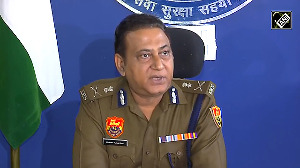Winding up arguments in a special court on the quantum of sentence for those convicted for the 1993 serial blasts in Mumbai, the defence counsel on Friday said no parallels can be drawn between this case and the 2001 Parliament attack.
"The prosecution itself desisted from pressing the charge of waging war against the government in the blasts case," defence counsel Majid Memon told the Terrorist and Disruptive Activities Act court of Judge P D Kode that conducted the trial.
The prosecution has heavily relied on the Supreme Court's judgment in the Parliament attack case, where the court upheld the death sentence for Mohammed Afzal Guru with the rationale that terror cases needed harsher sentences.
Memon argued that the March 12, 1993, bombings in the country's financial capital -- in which 257 people died -- was not an attack on the government, but an act of "retaliation."
He reiterated the defence of several accused that "had there been no December 6 (demolition of the Babri Masjid) and subsequent riots, there would have never been the (Mumbai) blasts."
Memon also opposed the CBI lawyer's demand that 44 accused convicted of conspiracy and charges under TADA be given the death sentence.
"Every conspirator has to be judged according to his role in the conspiracy," Memon noted adding, that demanding a blanket sentence for all was not correct.
He appealed to the court to take into consideration the fact that many of the accused have languised in jail for around 14 years.
"The court must be lax towards the accused" considering the delay in the conclusion of the trial, he said.
Of the 123 accused in the case, 100 were convicted by Kode. They include actor Sanjay Dutt, who was found guilty under the Arms Act for illegally possessing weapons.
Dutt was, however, acquitted of conspiracy and terror charges under TADA. Both the prosecution and defence have completed their arguments on the quantum of sentence for the convicts.
Meawhile, 52 people convicted in the 1993 serial blasts case sought to move "applications" before the TADA court on Friday to seek their elimination in "Nazi-style gas chambers."
As the day's proceedings got over in the court of Judge P D Kode, many of the convicts tried to catch his attention by waving individual applications to this effect.
Some of the applications also reiterated an old demand that the anti- terror TADA law should not be applied in the case.
The court, however, did not take these applications on record.
The common application, signed by 52 convicts, said those responsible for the "massacre" of Muslims during the post- Babri riots went unpunished, while "innocent" Muslims were framed in the case and left to rot in jail.
"Hitler is still alive in saffronised elements of India," it reads. The convicts said in the application that their families and the entire community should also be put in gas chambers.
The court has convicted 100 of the 123 accused in the case, and they are currently awaiting their sentencing.
The prosecution has sought the death sentence for 44 people convicted for conspiracy.
Throughout the 13-year trial, perhaps the longest in recent history, the defence counsel pleaded that the nearly dozen blasts that killed 257 people and wounded 700 were the reply of a community that was systematically targeted in riots that erupted after the demolition of Babri mosque in Ayodhya.
Special Public Prosecutor Ujjwal Nikam dismissed Friday's application as a pressure tactic by the convicts.
"They are resorting to pressure tactics. But nobody will succumb to such pressure," he said. If such tactics continue in future, the prosecution might seek action against those involved for contempt of court, he said.






 © 2025
© 2025